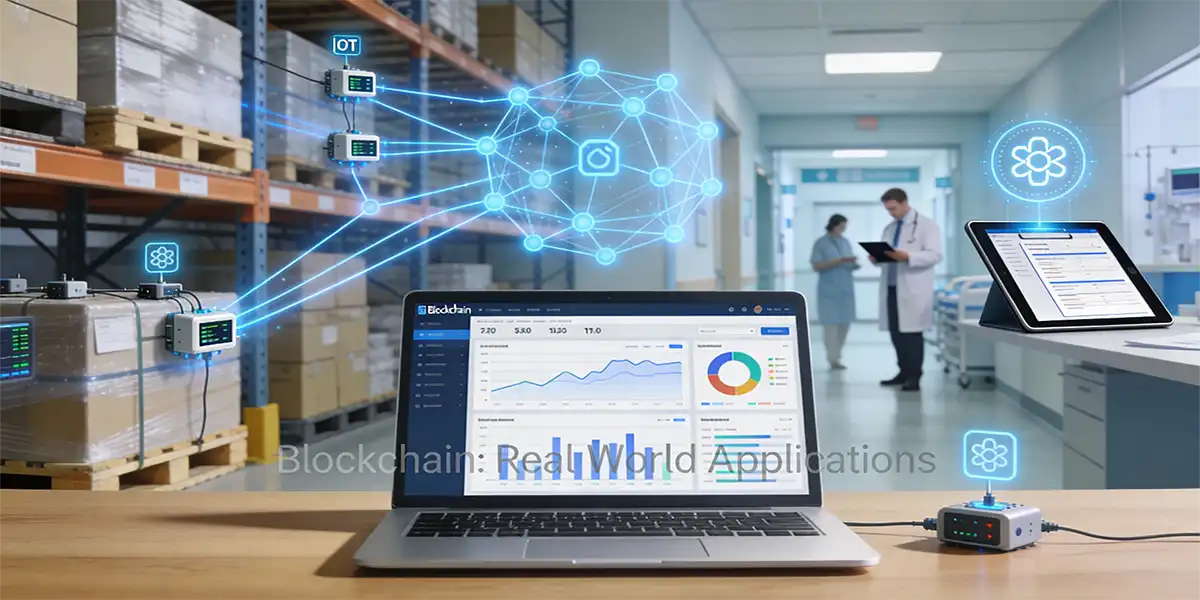Unveiling Blockchain Technology: Real World use of Blockchains:
If you’ve ever wondered about blockchain technology but felt intimidated by its jargon and technicality, don’t worry, you’re not alone. Let’s start simple: blockchain is essentially a digital ledger: a record book, that is secure, transparent, and tamper-proof. Now that we’ve demystified the concept, let’s explore how various industries are using this groundbreaking technology in the real world
If that sounds confusing, don’t worry, you’re not alone. Blockchain can be intimidating at first, but at its heart, it’s an ingenious way of ensuring trust and security in the digital world.
In essence, blockchain solves inefficiencies and trust issues inherent in traditional systems by introducing decentralization, transparency, and automation. Its transformative impact is evident across these industries, redefining how processes are executed and value is delivered.
Table of Contents
Here are some key industries leveraging blockchain:
1 Financial Services: Revolutionizing Banking and Payments
One of the earliest adopters of blockchain technology is the financial industry. Banks and payment processors have embraced blockchain to streamline their operations and provide better services to customers.
- Real world Use of Blockchains – Cross-border payments have always been notoriously slow and expensive, often taking days to complete with high fees. Blockchain, with its decentralized ledger, enables real-time transactions that are secure and cost-effective. Ripple, a blockchain-based payment protocol, facilitates instant international money transfers for banks and financial institutions.
- Additional Benefits – Blockchain reduces fraud, as every transaction is recorded on a public ledger. Smart contracts – self – executing agreements coded on blockchain, also eliminate the need for intermediaries like notaries, speeding up processes such as loans and insurance claims.
- Without Blockchains – Traditional systems rely on intermediaries like banks, which slow down processes like cross-border payments and inflate costs. Blockchain eliminates middlemen, enabling faster and cheaper transactions with transparency and security.
2 Healthcare: Enhancing Patient Care
The healthcare industry grapples with challenges like managing sensitive data, tracking patient records, and ensuring data privacy. Blockchain addresses these pain points with its secure and decentralized system.
- Real world Use of Blockchains – Imagine you visit a new doctor, and they need your medical history. Instead of relying on scattered paper records or vulnerable digital databases, blockchain enables a secure, unified system. Companies like Medical chain are using blockchain to create platforms where patients control their own data and grant access to healthcare providers as needed.
- Additional Benefits – Blockchain also enhances drug traceability, ensuring that counterfeit medications don’t enter the supply chain. Each step in a drug’s journey, from manufacturer to pharmacy, is recorded on the blockchain, promoting transparency.
- Without Blockchains – Patient data in traditional systems is siloed and vulnerable to breaches. Blockchain provides a unified, secure platform where patients have control over their records, improving privacy and accessibility.
3 Supply Chain Management: Improving Transparency
A common frustration in supply chains is the lack of visibility. How can you be sure that your ethically sourced coffee beans were truly produced under fair conditions? Blockchain offers a solution.
- Real world Use of Blockchains – Walmart, in collaboration with IBM, has implemented blockchain to track food from farm to store shelves. This innovation ensures better quality control and enhances consumer trust. For instance, if a batch of lettuce is contaminated, the source can be identified within seconds, allowing for swift recalls.
- Additional Benefits – Blockchain fosters ethical practices by verifying the authenticity of goods such as diamonds and luxury items. Initiatives like Everledger use blockchain to track the origin of diamonds, ensuring they are conflict-free.
- Without Blockchains – Traditional supply chains lack transparency, making it hard to track goods and ensure authenticity. Blockchain introduces tamper-proof tracking for every step, reducing fraud and inefficiencies.
4 Entertainment and Media: Protecting Intellectual Property
Artists, musicians, and writers often struggle to protect their work from piracy and unauthorized usage. Blockchain offers a way to safeguard intellectual property and ensure creators are fairly compensated.
- Real world Use of Blockchains – Audius, a blockchain-based music platform, allows artists to distribute their work directly to listeners without intermediaries. This means artists receive a fair share of the revenue, while listeners enjoy lower costs.
- Additional Benefits – Digital art and collectibles, known as NFTs (Non-Fungible Tokens), have exploded in popularity. These are unique blockchain-based tokens that prove ownership of a digital asset, providing creators with new revenue streams.
- Without Blockchains – Copyright protection in traditional systems often fails, with creators struggling to secure fair compensation. Blockchain enables direct distribution and ensures artists receive rightful earnings via smart contracts.
5 Real Estate: Simplifying Property Transactions
Buying or selling property often involves cumbersome paperwork, lengthy processes, and a slew of middlemen. Blockchain technology is revolutionizing this sector by simplifying and speeding up transactions.
- Real world Use of Blockchains – Propy, a blockchain-based platform, allows people to buy, sell, and even auction properties using smart contracts. The entire transaction, payment, title transfer, and escrow is recorded on the blockchain, ensuring transparency.
- Additional Benefits – Blockchain also reduces fraud by providing a tamper-proof record of property ownership. It enables fractional ownership, allowing people to invest in properties with lower amounts of money.
- Without Blockchains – Traditional property transactions are paper-intensive and involve several middlemen. Blockchain simplifies the process with smart contracts, offering transparency and eliminating delays.
6 Energy: Creating Smarter Grids
As the world shifts to renewable energy, there’s a growing need for smarter systems to manage resources. Blockchain is playing a pivotal role in creating these systems.
- Real world Use of Blockchains – Companies like Power Ledger enable peer-to-peer energy trading. For example, if you have solar panels and generate surplus electricity, you can sell it directly to your neighbors using a blockchain platform.
- Additional Benefits – Blockchain supports carbon credit tracking, ensuring that companies meet their sustainability goals. It also helps optimize energy distribution, reducing waste.
- Without Blockchains – Traditional energy systems are centralized, limiting efficiency and flexibility. Blockchain enables decentralized energy grids, optimizing resource use and allowing peer-to-peer energy trading.
7 Government and Voting: Fostering Trust
Governments often face challenges related to inefficiency, corruption, and lack of public trust. Blockchain can transform public administration by promoting transparency and accountability.
- Real world Use of Blockchains – Blockchain-based voting systems ensure secure, tamper-proof elections. Each vote is recorded on the blockchain, providing an auditable trail. Estonia has successfully implemented blockchain in its e-governance system, including digital voting.
- Additional Benefits – Governments can also use blockchain for land registry, tax collection, and welfare distribution, minimizing errors and fraud.
- Without Blockchains – Traditional voting and administrative systems are prone to corruption and inefficiency. Blockchain fosters trust with transparent, tamper-proof records, ensuring accountability.
8 Education: Verifying Credentials
Ever worried about the authenticity of a diploma or certificate? Blockchain provides a solution by creating a tamper-proof record of academic achievements.
- Real world Use of Blockchains – The University of Melbourne has started issuing digital credentials using blockchain, allowing employers to verify qualifications instantly.
- Additional Benefits – Blockchain streamlines administrative processes in educational institutions, reducing costs and improving efficiency.
- Without Blockchains – Verifying traditional academic credentials can be cumbersome and fraudulent. Blockchain makes records tamper-proof and instantly verifiable, benefiting both institutions and employers.
9 Gaming: Unlocking New Realities
The gaming industry is leveraging blockchain to enhance player experiences and create new revenue models. Blockchain integrates well into gaming because of its ability to provide ownership, transparency, and decentralized marketplaces.
- Real world Use of Blockchains – Blockchain-based games like Axie Infinity allow players to earn cryptocurrency by playing. The concept of “play-to-earn” is transforming gaming from just a pastime into a potential income source.
- Additional Benefits – Players can truly own in-game assets, such as characters or weapons, as NFTs (Non-Fungible Tokens). These assets can be traded or sold in blockchain-powered marketplaces. Blockchain also ensures fairness in gaming by providing tamper-proof records, reducing cheating and fraud.
- Without Blockchains – Traditional gaming systems often don’t allow players to own in-game assets. Blockchain introduces true ownership through NFTs, empowering players to trade or sell assets outside the game.
10 Charity and Nonprofits: Promoting Trust and Efficiency
Charities often face scrutiny regarding the allocation of donations. Blockchain addresses these concerns by offering transparency and accountability.
- Real world Use of Blockchains – Platforms like BitGive use blockchain to show donors exactly how their funds are being spent. For instance, donors can see if their contribution helped buy books for a school or build a well in a remote village.
- Additional Benefits – Smart contracts can automate and streamline the distribution of funds. For example, if a donation goal is met, the funds are automatically disbursed to the intended project, eliminating administrative delays and reducing overhead costs.
- Without Blockchains – Donations in traditional systems often lack transparency, leading to trust issues. Blockchain tracks funds in real-time, ensuring accountability and boosting donor confidence.
11 Retail: Transforming Shopping Experiences
The retail industry is embracing blockchain to enhance transparency, improve customer trust, and streamline operations. From supply chain management to loyalty programs, blockchain is reshaping how retailers interact with consumers.
- Real world Use of Blockchains – Retail giants like Walmart use blockchain to track the journey of products from farm to shelf. This ensures food safety and allows customers to verify the authenticity of products. For example, scanning a QR code on a package of lettuce can reveal its entire journey, from the farm where it was grown to the store where it was sold.
- Additional Benefits – Blockchain-powered loyalty programs are gaining traction. Retailers can use blockchain to create secure and transparent systems for rewarding customers. American Express, for instance, has explored blockchain-based loyalty points that can be redeemed across various platforms. Blockchain also combats counterfeiting by providing a tamper-proof record of product authenticity, ensuring that consumers get genuine goods.
- Without Blockchains – Traditional retail struggles with counterfeit products and inefficient loyalty programs. Blockchain verifies product authenticity and creates seamless, blockchain-powered reward systems.
12 Cryptocurrency: The Foundation of Blockchain
You can’t talk about blockchain without mentioning cryptocurrencies, the digital currencies that brought blockchain into the mainstream. Cryptocurrencies operate on blockchain, providing a decentralized alternative to traditional money.
- Real world Use of Blockchains – Bitcoin, the first cryptocurrency, enables peer-to-peer transactions without banks or intermediaries. Ethereum, another popular cryptocurrency, powers smart contracts and decentralized applications (DApps).
- Additional Benefits – Cryptocurrencies are revolutionizing how we think about money and payments. They provide financial inclusion to people without access to traditional banking and offer faster, borderless transactions.
- Without Blockchains – Unlike traditional money systems controlled by governments and banks, blockchain-based cryptocurrencies are decentralized, offering more financial inclusion and freedom.
Blockchain technology is reshaping industries across the board with its transparency, security, and efficiency. From revolutionizing finance, healthcare, gaming, and retail, to fostering trust in charity and nonprofits, government, and education, its applications are vast and impactful. Supply chain management, entertainment, real estate, energy, and cryptocurrency showcase how blockchain improves accountability, fairness, and sustainability. As these 12 industries above continue to innovate using blockchain, the technology cements its role as a transformative force in the modern world, driving progress one block at a time.
If you wish to learn more about Blockchain technology click the article below.


